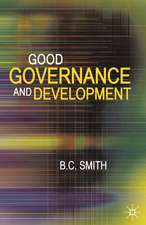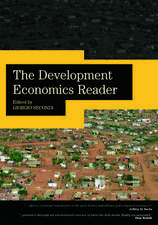The Sociology Of Development: The Impasse And Beyond
Autor Ray Kielyen Limba Engleză Paperback – 31 aug 1995
| Toate formatele și edițiile | Preț | Express |
|---|---|---|
| Paperback (1) | 419.50 lei 6-8 săpt. | |
| Taylor & Francis – 31 aug 1995 | 419.50 lei 6-8 săpt. | |
| Hardback (1) | 1922.08 lei 6-8 săpt. | |
| Taylor & Francis – 31 aug 1995 | 1922.08 lei 6-8 săpt. |
Preț: 419.50 lei
Preț vechi: 493.52 lei
-15% Nou
Puncte Express: 629
Preț estimativ în valută:
80.30€ • 87.25$ • 67.49£
80.30€ • 87.25$ • 67.49£
Carte tipărită la comandă
Livrare economică 21 aprilie-05 mai
Preluare comenzi: 021 569.72.76
Specificații
ISBN-13: 9781857281965
ISBN-10: 1857281969
Pagini: 204
Dimensiuni: 138 x 216 x 11 mm
Greutate: 0.24 kg
Ediția:UK edition
Editura: Taylor & Francis
Colecția Routledge
Locul publicării:Oxford, United Kingdom
ISBN-10: 1857281969
Pagini: 204
Dimensiuni: 138 x 216 x 11 mm
Greutate: 0.24 kg
Ediția:UK edition
Editura: Taylor & Francis
Colecția Routledge
Locul publicării:Oxford, United Kingdom
Public țintă
Postgraduate, Professional, and UndergraduateNotă biografică
Ray Kiely University of East London
Cuprins
Chapter 1 Introduction: The impasse summarized; Part 1 The theoretical impasse; Chapter 2 Marx and development; Chapter 3 Modernization, dependency and development; Chapter 4 Structuralist Marxism and development; Part 2 The impasse and the contemporary global political economy; Chapter 5 The impasse and Third World industrialization; Chapter 6 The politics of the impasse I: states and markets in the development process; Chapter 7 The politics of the impasse II: challenging Third Worldism; Chapter 8 Conclusion;






















